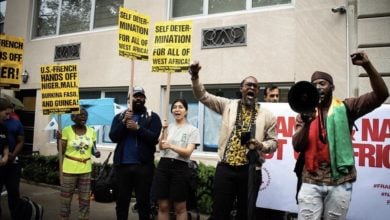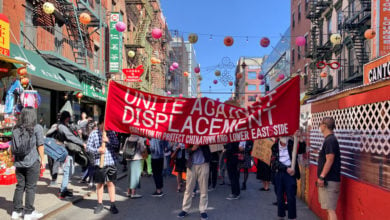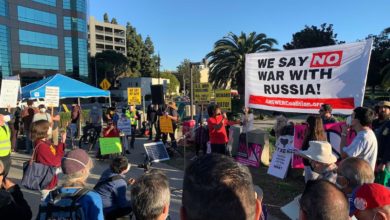On March 17, tens of thousands of people traveled from around the country to march on the Pentagon to protest the U.S. war in Iraq. Organized by the ANSWER Coalition—Act Now to Stop War and End Racism—the march was the anchor for hundreds of protests and demonstrations during the weekend of the fourth anniversary of the U.S. invasion. Protests drew 50,000 in Los Angeles, 40,000 in San Francisco and thousands more in local actions around the country.
Despite the overwhelming popular rejection of the U.S. war in Iraq, the national big-business media downplayed the actions—and in some cases carried out smears against the demonstrators and organizers who made the events so powerful.
This article is based on a talk given by ANSWER national coordinator Brian Becker to activists and volunteers on March 18, the day after the march on the Pentagon. Becker is on the editorial board of Socialism and Liberation magazine.
The media coverage of the tremendous anti-war mobilizations on March 17, on the fourth anniversary of the U.S. invasion of Iraq, provides a good opportunity to look at the role of the media in capitalist society.

There are two aspects of every political activity. There is what people experience and feel for themselves and which they know to be true.
Then there is the re-definition or reinterpretation of events for them by the media and the pundits of what they experienced or felt. That becomes the “official” version. And the official version is based on the class orientation of those who are doing the defining and interpreting.
It is now a cliché, but the 18th-century French philosopher and commentator Voltaire once wrote, “History is the lie commonly agreed upon.” Official history, in other words, does not necessarily correspond to what actually existed.
Look at feudal Europe, for instance. Schools teach who is the king, who is the queen, and all the official history of the comings and goings of kings and queens, the great men and women—mostly the great men. The masses of people do not really exist. They are cogs in a machine.
Another example is the U.S. Civil War, which formally ended slavery in the United States. After the Civil War, there was a period called Reconstruction. It was a period of radical democracy in the United States. This democracy, which granted real political rights to the emancipated slaves, was ended in 1877. The northern-based Republican Party and the southern-based Democratic Party—the party of the ex-slave owners—ended Reconstruction in a political compromise.
The end of Reconstruction meant an end to the progress made by African Americans in achieving some basic democratic rights. From then on, from 1877 to the 1930s, the history of the Civil War was written from the point of view of the slave owners—even though they lost! This was partly how white people were indoctrinated with racism.
While slavery never returned in a social sense, brutal oppression and semi-slavery was the norm for African Americans for the next 100 years. White people who had been infected with the virus of racism—which acted as a system of management by the U.S. ruling class prior to the Civil War—continued to be indoctrinated with the poison of white supremacy following the defeat of Reconstruction. The “official history” of the ruling class, the government, the establishment, was to treat the Civil War as a terrible mistake, and the ideology of the defeated slave owners was enshrined as the dominant ideology.
This shows that the “official” view of events may not correspond at all with what is happening at the moment or what happened in the past. It may instead reflect the political needs of the ruling class—like promoting racist views despite presiding over “free” labor.
Framing the anti-war movement
On March 17 and subsequently, we witnessed those who are in power rewriting and reinterpreting what people experienced or knew to be true.

Many reports in local papers and television channels were positive. They gave a sense of the breadth of the protests that took place from the Pentagon to small towns around the country.
But the press coverage from the biggest media—the media that really represents the voices of the U.S. ruling class—was uniformly aimed to diminish what had been achieved that weekend.
For example, the Washington Post coverage of the march on the Pentagon, which had been pretty favorable before the demonstration, was largely negative. It gave great coverage to the racist, fascistic pro-war elements who called themselves the “Gathering of Eagles” and who opposed our march. These were not just unhappy veterans, although some of them may be. Their leadership is fascistic.
One Washington Post reporter asked me for my comment. “Did you see the passion of those people?”
The fact that they had passion says nothing about what they stand for or what their program is. If you go to their website, they call Barack Obama, “Obama Bin Laden.” They are a vile, anti-Black, anti-Arab, anti-Muslim formation.
So of course they are passionate. They would like to passionately exterminate us.
The media gave the fascists a great deal of coverage. It was a well-organized, well-financed campaign. They had 1,000 right-wingers there, probably mostly from the area. They could get on their motorcycles and come.
They can get 1,000 bikers to come in for a counter-protest. We had so many more people than that. But there were more pictures of them than of our demonstration.
Old-fashioned red-baiting
The New York Times, the “paper of record,” has two versions on our protest. There is the first version, a kind of mean-spirited article, but nothing out of the ordinary for the Times.
The second article, which was re-edited and printed in the late edition of the paper, is nothing short of old-fashioned red-baiting. It is based on an interview they did with me at the end of the demonstration.
They called and wanted to know if it is true that I am a socialist, a member of the Party for Socialism and Liberation. The reporter asked me, “What is your purpose, as a socialist? What is your view of the demonstration? Do you really think that Bush is going to listen? Do you really think that the Congress is going to listen?”
I explained that our audience was the people of the United States. When millions of people are drawn into political life—as they were in the Civil Rights movement, the movement against the Vietnam War, or the campaign for women’s rights—that is when real change is not only possible but necessary. That is the kind of movement that the ANSWER Coalition is trying to build.
The Times article paid virtually no attention to the tens of thousands of people who had braved horrendous winter weather to join the march on the Pentagon. They all but ignored the large delegations of anti-war veterans and active-duty soldiers who marched at the front of the demonstration.
Instead, the Times reporter and editors chose to portray the demonstrators as dupes of sinister communists who had no real interest in the anti-war movement. Never mind the fact that we in the ANSWER Coalition have worked tirelessly to build the U.S. anti-war movement since the Sept. 11, 2001, attacks on New York City and Washington.
Only a little more than half of the 750-word article, some 390 words, could be construed as reportage—and even that was biased. Another 140 words were devoted to the counter-protest and the riot police intimidation of the crowd, with the message that coming to a protest means trouble. And a full 214 words—close to 30 percent of the article—were devoted to the socialist menace behind the ANSWER Coalition.

This re-interpretation flies in the face of what people actually experienced that day. People loved the demonstration. They welcomed activists who presented information on the Cuban Five. They embraced many groups and speakers who called for impeaching Bush. These are natural connections—there is nothing sinister about that.
Most of all, people who took part in the march on the Pentagon were proud to have participated. They were proud to commemorate the 40th anniversary of the 1967 march on the Pentagon to end the Vietnam War. They were proud to have marched through cold weather and icy winds across the bridge from Washington to the Pentagon.
But the New York Times tries to re-write what people saw and felt. They re-write it first for the millions of readers who were not present and trust the U.S. “paper of record.” But they also re-write it for the people who did attend, so they will not remember how they felt, the emotions they had and the things they knew to be true.
It is creating a fiction. Those who own the big-business media can create the fiction; they are the ones who can agree upon what the lie is. That is the goal of the media.
Rev. King was targeted, too
Consider also the case of Martin Luther King, Jr. Today, he is an icon. That is the official version now, after he is dead.
But when he was alive, Martin Luther King was under constant FBI surveillance. The press routinely reported that King was acting as a front for the Communist Party. They insisted that he purge leftists from his movement, because otherwise he could be tainted. And on some occasions, King did just that, removing socialists from his midst because he felt that the media attacks would discredit the movement.
Finally, the Civil Rights and anti-war movements became so radical in spite of the bad press that King, in order to continue to be credible with the people, had to move to the left himself. He came out against the Vietnam War in 1967.
He did not wake up on April 4, 1967, and suddenly conclude, “This war is a wrong.” As a progressive person and an anti-colonial figure, he knew that from the beginning. But before that time, he undoubtedly calculated that talking about the war would anger some elements of his middle-class allies and especially upset President Lyndon Johnson and the Democratic Party, which might otherwise make concessions on civil rights. It was the Democratic Party that was in charge of the Vietnam War effort.
But by 1967, Dr. King could no longer sit on the sidelines. Masses of people had come out against the Vietnam War. Opposition to the war ran deep in the Black communities around the country.
So Martin Luther King not only felt more comfortable taking an anti-war position—he felt compelled to take a public stand. It was the strength of the movement of the people that changed the political dynamic. The red-baiting demonization of the anti-war movement by the capitalist media no longer had the same sway.
The job of the big-business media is to mislead, to keep people captive and to weaken the anti-imperialist wing of the anti-war movement. The ruling class feels threatened by it.
Lies based on fear of the people
At the end of the day, despite the distortions and red-baiting and rewriting of facts, the world will know that the anniversary of the war was marked by massive, widespread protests. The French newspaper Le Monde reported that 50,000 had joined the march on the Pentagon.

The background to this specific campaign is the beginning of a mood of widening layers of people who have not been part of the traditional left or part of the progressive movement. The bourgeoisie, the real ruling class in the United States, is well aware that a burgeoning anti-war movement can become a radical movement, as happened in the 1960s.
The ruling class knows that our hopes and plans are not simply wishful dreams. It is aware that the growing movement is happening amid a political contradiction that ruling-class strategists cannot resolve: the war in Iraq cannot be really won on terms favorable to them, and yet the war makers cannot really leave. The tension, the contradiction, the dialectic of their own aggression, continues to require people to act.
They know the movement can grow, and if it is going to grow, they do not want it to become a revolutionary movement. In fact, every article and story about the growing anti-war movement that is developed by the principal organs of the capitalist-owned media is written with the aim of stopping this movement from developing into a genuine revolutionary alternative.
That is the purpose of the big capitalist media’s propaganda campaign. But we can counter it.
We can counter it with our own media, our own agitation and propaganda. We counter their lies with the truth, and we do it through the Internet. We do it by widening our distribution of socialist literature like Socialism and Liberation magazine. We do it by appealing directly to the millions of people with leaflets and stickering.
Most importantly, we can counter their propaganda by continuing to carry out bold and massive actions. The greatest source of how people learn about things and get moved into action is when they take part in protests and demonstrations, when their friends or family members are involved in them and talk to them.
We will make sure that the history that we all made on March 17 is not transformed into fiction, that the lie agreed upon by the media and the ruling class is countered by our own story that is based in reality. Our task is to help people remember what they experienced, what they felt—all of which they felt yesterday but which they will be talked out of believing unless we fight for this interpretation.
Tens of thousands march on the Pentagon, March 17.
Photo: Alexis C. Glenn/UPI
U.S. media is owned by a handful of the biggest corporations like General Electric, pictured here, owner of NBC.
Photo: Brad Rickerby/Reuters
Photo: Bill Hackwell
San Francisco, March 18
Photo: Bill Hackwell






